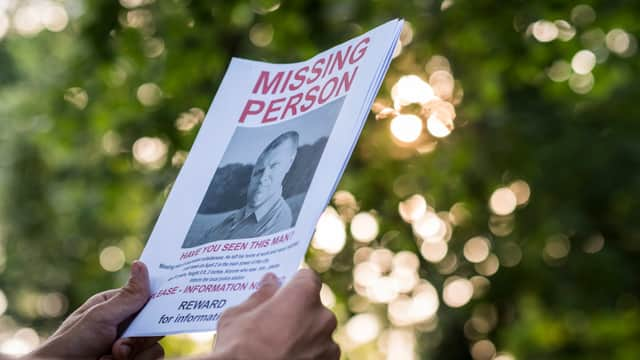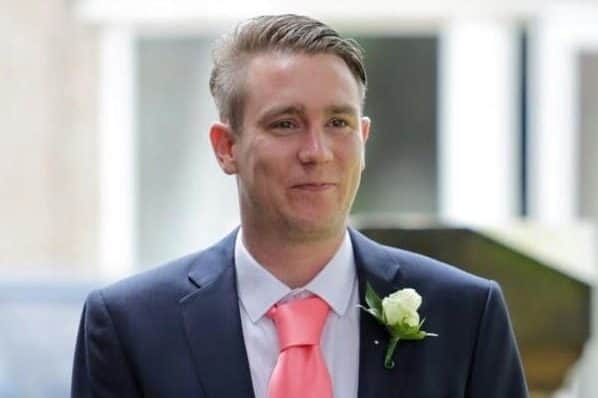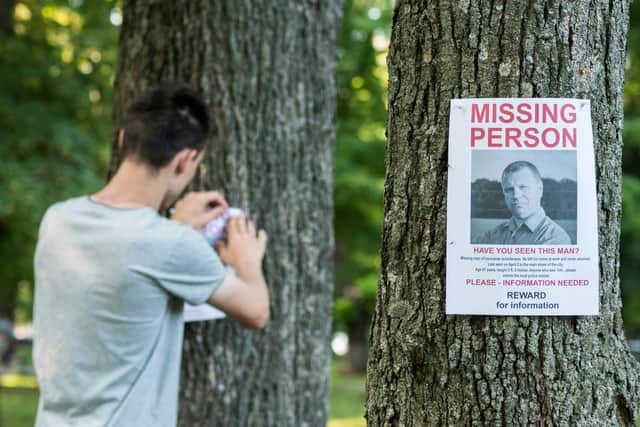Thousands of people go missing every year - here's what you need to know


Rory Johnson Hatfield was last seen in York, in the early hours of Friday 20 November 2015. He was aged just 29 when he went missing.
CCTV cameras picked up his last seen moments, yet despite a five a year long investigation Rory has never been traced, leaving his family with the agony of not knowing what happened to their beloved son.


Advertisement
Hide AdAdvertisement
Hide AdHe is described as white, 5ft 11in in height with a slim build and short blonde hair and “very sociable” by his father Doug Hatfield.
On the night he went missing Rory was wearing a round neck dark coloured top, blue jeans and white and navy trainers.
Like any other young man, he had been enjoying a night out with friends.
“We didn’t know about this sort of thing and no one does until a family member or somebody close to you goes missing,” said Doug.
“You don’t realise how prevalent it is.”
Thousands of missing person incidents across the UK
Advertisement
Hide AdAdvertisement
Hide AdThe latest figures published by the National Crime Agency’s (NCA) Missing Persons Unit and analysed by the JPIMedia Data Unit, shows hundreds of thousands of missing person incidents were reported to police forces in 2018/19.
Thousands of cases remain unsolved too, with the families of missing people and charities believing more could be done to tackle the problem.
A National Register of Missing People is currently in development, overseen by the Home Office, to improve understanding of missing person incidents.
Loading....
Loading....
Loading....
Although the figures show hundreds of thousands of cases, changes in recording processes over the years has meant concrete comparisons between the yearly figures could not be made.
Advertisement
Hide AdAdvertisement
Hide AdHowever, the NCA confirmed to the Data Unit that the number of missing people has been increasing since they started collecting and publishing figures but pointed out that the year-on-year increases started to level off in the 2017-2018 year.
Because of insufficient data a similar analysis could not be carried out for Northern Ireland and Scotland.
Mental health crises
From abduction to suicide, there are many complex reasons as to why a person goes missing.
Analysis of the NCA data found mental health was the leading cause of 18-59 year olds going missing, while dementia (including Alzheimers) was the leading cause of over 60s going missing. Relationships were the most common cause for children going missing
Advertisement
Hide AdAdvertisement
Hide Ad“Behind these figures are individual people, who may be experiencing mental health crises, problems where they live, exploitation, domestic violence, or a range of other issues,” Jane Hunter, Senior Research and Impact Manager at Missing People charity, told us.
“We must not forget those left behind, desperately searching for answers to their loved one’s whereabouts.
Loading....
"Going missing should be seen as a warning sign, that something is seriously wrong and that support must be available upon their return.”
Joe Apps, Head of the UK Missing Persons Unit at the National Crime Agency, added, “There are a vast array of reasons for people to go missing, and it can be prompted by almost anything in someone’s life. This ranges from a personal decision to escape family or financial worries, to being a victim of county lines gangs or child sexual abuse and exploitation.
Advertisement
Hide AdAdvertisement
Hide Ad“We continue to work with partners in law enforcement and the voluntary sector to identify risk, safeguard vulnerable people and support families and friends.”
Long term missing people
Police forces across the UK deal with thousands of missing persons reports a year but that doesn’t make the task of tracing a missing person any less complicated.
Although the majority of missing people are found within 24 hours, there are 4,638 long term missing people whose fate is largely unknown.
There’s very limited public information about who these people are too. This is for a variety of reasons including privacy and safety concerns.
Advertisement
Hide AdAdvertisement
Hide AdTo better understand these and other missing person cases, a National Register of Missing Persons (NRMP) is currently in development, overseen by the Home Office. It's expected to be delivered in 2023.
A spokesperson for the Home Office said the NRMP will “significantly improve” their understanding of missing person incidents.
They said it will allow forces in the UK to manually record missing and associated found incidents, and allow them to access data about missing people from other force areas.


The spokesperson said: “It is vital that the police have access to fast and accurate data and intelligence that can be shared between forces.”
Advertisement
Hide AdAdvertisement
Hide AdMs Hunter also added that missing people need support on their return to prevent repeated missing incidents.
She said, “Whilst police rightly take the lead on investigations into disappearances, we’d like to see the return of a missing person as a moment that activates a multi-agency response, to identify which support measures should be put in place to safeguard and prevent further missing episodes.”
'Missing people need more attention'
While the personalities, names and faces of long term missing people will never be forgotten by family and friends, most long term missing people do not receive prolonged and consistent attention by the police and media.
Doug said these cases need to be taken more seriously.
“The thing is police forces in general treat missing people ambivalently,” he said.
Advertisement
Hide AdAdvertisement
Hide Ad“Unless there is proof someone has been abducted or foul play, they're very lax about the investigation of missing people.
"The attention grabbing news is when it involves a child, a young girl or a lady. When young men go missing they get very little publicity.”


NCA records also showed a greater number of missing persons cases involve males than females.
“Rory got no publicity outside Yorkshire,” Doug added. “We’ve never had national coverage.”
Advertisement
Hide AdAdvertisement
Hide AdDoug explained that because York attracts so many tourists, a larger UK-wide appeal would have likely reached more people who were potentially in the area at the time of Rory’s disappearance.
He said there are parts of the investigation he wants to go over again this year with the police.
“It’s upsetting and annoying and the police could do far more in the case of missing people,” he said.
“I understand it from the police point of view though, because there are no leads with Rory’s case. So it’s difficult to follow when there’s nothing to follow but that doesn’t mean we can’t get publicity.”
'Emotions are up and down constantly'
Advertisement
Hide AdAdvertisement
Hide AdA spokesperson for North Yorkshire Police told us that when a missing person report is received, a Force Incident Manager is informed and a risk assessment is immediately undertaken.
They said this “informs the policing response to ensure that a person is safely found as quickly as possible”.
The spokesperson said: “All available information is assessed in accordance with the College of Policing's Authorised Professional Practice to determine the risk to the individual involved.
"The application of this process also ensures each case is investigated effectively and is appropriately supported by policing resources.”
Advertisement
Hide AdAdvertisement
Hide AdNorth Yorkshire Police also said media appeals are issued locally and nationally for missing people.
They said an appeal for Rory was featured on the BBC Crimewatch Roadshow in 2018.


The spokesperson added, “We urge anyone who has any information about Rory that they haven’t shared with the police, or anyone who has new information, to get in touch with us.”
But for Doug and the rest of Rory’s family and friends, five years after his disappearance, the trauma remains a daily battle.
“Your emotions are up and down constantly,” Doug added.
Advertisement
Hide AdAdvertisement
Hide Ad“One week is never the same as the next. That goes for me and all the rest of his family, his sisters, brothers… We talk about Rory a lot and when we don’t, we find ourselves upset.”
“We need a bit more attention paid to missing people and not just in the short term. I know it must be difficult, but it’s difficult for us.”
If you have any details about Rory Johnson Hatfield please contact 101 and quote reference number 12150207141 or contact Crimestoppers on 0800 555 111.
Further details of Rory Johnson Hatfield’s disappearance can be found on the North Yorkshire Police website.
Visit the Missing People website or call or text 116 000 for free and confidential support and information.